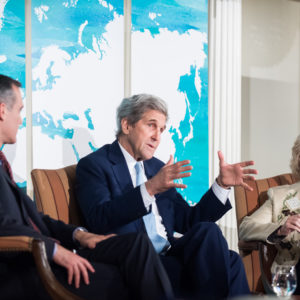Lacking the usual prerequisites of elected political office—experience, informed opinion, compassion, willingness to listen—Republican Donald Trump presents the American people with many questions about what he will really do. His election, what the New York Times calls a “shocking upset,” could reveal unrecognized attitudes about—and presage policy reversals on—foreign relations, the environment, media coverage of the White House, gender and race relations, and the status of Muslims and immigrants, to name just a few.
Trump edged by Hillary Clinton in the Electoral College vote, winning 279 to 228 (270 electoral votes are necessary for victory), while she eked out a win in the popular vote.
Bostonia asked faculty experts in several fields for their assessments of what a Trump presidency portends.
Unity

Stephen Prothero, professor of religion, College of Arts & Sciences
The election revealed on one level what we already knew—that the country is deeply divided over the culture wars question that has bedeviled us since the beginning of the republic: Who is and who is not a true American? Many white voters turned their back on a Democratic Party that for two decades has turned its back on the working class, staking claim to their Americanness by voting for a candidate who would exile Muslims, Mexicans, and African Americans from the American family. The result—an empty popular vote victory for Clinton and a shocking electoral vote victory for Trump—has left my liberal friends shocked that America reflects their Facebook pages and suburban neighborhoods about as well as a fun house mirror. Trump will not ban Muslims from America. He will not deport tens of thousands of undocumented immigrants. But our “one nation,” not-so-indivisible, is different today nonetheless, revealing depths of nativism and Christian bigotry that I, as a historian of religion, have always known were there, but as an American and a father, have all too often wished away.
International Relations

Adil Najam, professor and dean, Pardee School of Global Studies
Given all that was said or implied in Donald Trump’s election campaign, many countries would be rather worried right now, most would be confused, and all would be curious about the likely directions his actual foreign policy might take. His most urgent foreign policy task should be to give them—and the American public—some clarity on just how seriously things said during the campaign should be taken, or not. But the most important task before President Trump’s foreign policy team is to restore America’s political image abroad. America’s image—and the image of American democracy—has taken much battering this election cycle. It will take a lot of tender loving care to restore it. If not restored, it will affect everything. Everything!
Climate and the Environment

Cleveland Cutler, professor of earth and environment, CAS
Mr. Trump’s stated positions include eliminating the Environmental Protection Agency and “bringing back the coal jobs.” The Clean Air Act, the Clean Water Act, and other prominent environmental protections have deep support in the country because people understand that they are fundamental to the health of people and to the natural systems that sustain all life. The genie is already out of the bottle for coal. There is no plausible scenario in which investment money will flow to building more coal-fired power plants in the United States due to the global momentum to mitigate the worst effects of climate change. This is a strong market-driven force that even the president of the United States cannot reverse, although he could slow it temporarily. Telling people in coal states what they want to hear instead of working on programs that could actually help rural communities would be poor leadership.
Gender

Virginia Sapiro, professor of political science, CAS, and former dean, Arts & Sciences
The politics of gender in the 2016 election go well beyond the fact that the Democratic candidate for president was a woman. We don’t know how many votes turned on the question of whether the voter preferred, other things being equal, a woman or a man. When all is said and done, in the high-quality data analysis, which won’t be able to happen for some time, we are unlikely to find a lot of impact of the gender of the candidates per se in the outcome. Nevertheless, the gender politics of this election is worth understanding. Although the majority of Democrats (especially) and Republicans were bothered at least to some degree by Trump’s treatment of women, that was not important enough to make Republicans and the demographic groups that tend to support Republicans move away from him. Indeed, some people liked his anti–“political correctness” stance, by which they meant his willingness to say things many people consider sexist, racist, or xenophobic. Throughout the campaign, a vocal minority of Trump supporters felt free to say and display statements and symbols that are very derogatory of women in particular, to name Clinton by female body parts, etc., and in the politics of this campaign, that was widely tolerated. On the other hand, on election day, all day long people, often with their children, filed past the graves of Susan B. Anthony and Ida B. Wells, two major suffrage leaders, one white and one African American, to pay respects to those who fought for women’s rights. So our country’s attitudes about gender are divided, to say the least. But the outcome wasn’t driven by gender. It was driven by partisanship, race, class, urban-rural divides, and deep cultural differences and the political attitudes that flow from these.
The Media

Thomas Fiedler (COM’71), dean and professor of the practice, College of Communication
There is much to criticize in the news media’s coverage of this presidential campaign, and I expect those who shaped that coverage will engage in rounds of self-reflection in the weeks and months ahead. That is necessary and to the good. But President-elect Trump’s fevered attacks on the “lying” press, including his threat to abolish the White House press corps, will pass after he enjoys a good night’s sleep, an hour in the Trump Tower’s Jacuzzi, and his return to Twitter. Many attacks are made in the heat of battle that are quickly forgotten when calm returns, as Trump’s own history shows. His unquenchable hunger for the limelight will demand media feeding.
Muslim Americans

Kecia Ali, associate professor of religion, CAS; past president, Society for the Study of Muslim Ethics
Trump’s victory bodes extremely ill for American Muslims, not only for what damage he may do while in office, but also for what it says about the majority of white Americans. The conjoining of racism, sexism, and Islamophobia in his campaign rhetoric was unprecedented. By loudly and proudly espousing sentiments, policies, and acts that had previously been off-limits in polite political circles, he opens the way for government officials and private citizens to do the same, with increasing impunity. There are hopeful glimmers of resistance—sustained local activism within and across marginalized communities—but white Americans, including the majority of white women who voted for Trump, will have to repudiate antiblack racism and anti-Muslim bigotry, which are linked to each other and shaped by sexism, for things to change.
American Politics

Bruce Schulman, William E. Huntington Professor of History, CAS
What does Trump’s victory mean for the two major political parties and the electoral coalitions that define this highly polarized electorate? For weeks, observers wondered about possible civil war, even an existential crisis within the Republican Party, but now eyes turn toward the Democrats. For more than a generation, ever since young Hillary Clinton worked for George McGovern in 1972, the Democrats have been remaking themselves into the party of the New America. They have built their electoral strategy around a coalition of college-educated whites, people deeply embedded in the postindustrial information economy, along with racial minorities. In the process, they de-emphasized the working-class white ethnics that had formed the foundation of Democratic coalitions from the 1930s to the 1960s. With the election of Obama, that new America (and a stable majority for Democrats) seemed to have emerged. And if demographic predictions hold, that majority might take shape in future elections (it may already form a reliable majority of the popular vote). But so far as we can tell from the piecemeal data we have from November 8, it’s clear that the educated, high-tech whites-plus-minorities strategy is no guarantee of an Electoral College victory for the Democrats. Don’t be surprised to see finger-pointing, soul-searching, and recriminations on their side of the aisle.























































I’m a COM grad and was never aware of the very left slant of the school as represented in this compilation. Dean Fielder’s comments were the most accurate-stating “There is much to criticize in the news media’s coverage of this presidential campaign, and I expect those who shaped that coverage will engage in rounds of self-reflection in the weeks and months ahead.” The extreme liberal views of Boston, New England and New York do not reflect the views of the majority of our nation. The largely New York based media is biased by default. Trump shut them all up. His style isn’t typical, but his message resonated with America.
Another left wing article about President Elect Donald J. Trump whom I proudly supported and am thrilled has won! The constant hypocrisy of the left is in full view in this article, particularly in the discussion on Muslims. Vetting people from terrorist sponsored nations is not bigotry and if the author of this article hasn’t heard, the terrorists happen to be Muslim!! Only a liberal could at once falsely attack someone as a bigot while at the same time, calling on “white women to repudiate” a religion whose very tenants are to deny women basic freedoms!!! Does it take a genius to see the total absurdity of this statement? BU, you should be ashamed of yourself for promoting such filth, and for slandering the President Elect. It’s articles like this which serve to incite the horrible rioting and lawlessness now on our streets! Consider me ‘unsubcribed’ from your liberal propaganda.
I didn’t vote for Mr. Trump, but I am very pleased that he defeated Mrs. Clinton. Clinton’s election would have doomed the USA to becoming a stagnant, impotent, European-style social welfare state. Now we have a chance to undo the damage Obama has done by removing the morass of government regulations and taxes that have burden our economy. My only fear is Trump’s protectionist trade policy.
It’s all a cycle. People were tired of the old guard and wanted something new. Too bad the “new” will probably be made up mostly of those that implemented policy nearly steering the country off the cliff in 2008. We had a great economy when a Dem left in ’01. We had a disaster when a Rep left in ’09. We have a growing economy with the first true wage growth documented since the Great Recession as a Dem leaves in ’17. See where this is going. It’s not about logic, it’s about emotion. Logic would have chosen another Dem. Look where the economy is in ’18 to determine who will win the mid-terms. It will most likely be another “change” election if President-Elect Trump and his ideological Congress do nothing to improve the lives of most Americans…which is most likely the case.
“Portents”? Really?
The tagline in this article Gives the authors thought line away: it presumes that DJT’s presidency could have calamitous effects on our country.
One wonders if the same term would be used if Hillary Clinton had won the election. Would the prospects of her presidency “portend” the overthrow ( or at the very least, the dissing) of the rule of law in this country?
Experts eh? Are these the same experts who stated that Trump had absolutely no chance of winning?
Hopefully Donald Trump will Lead U.S The right Direction.